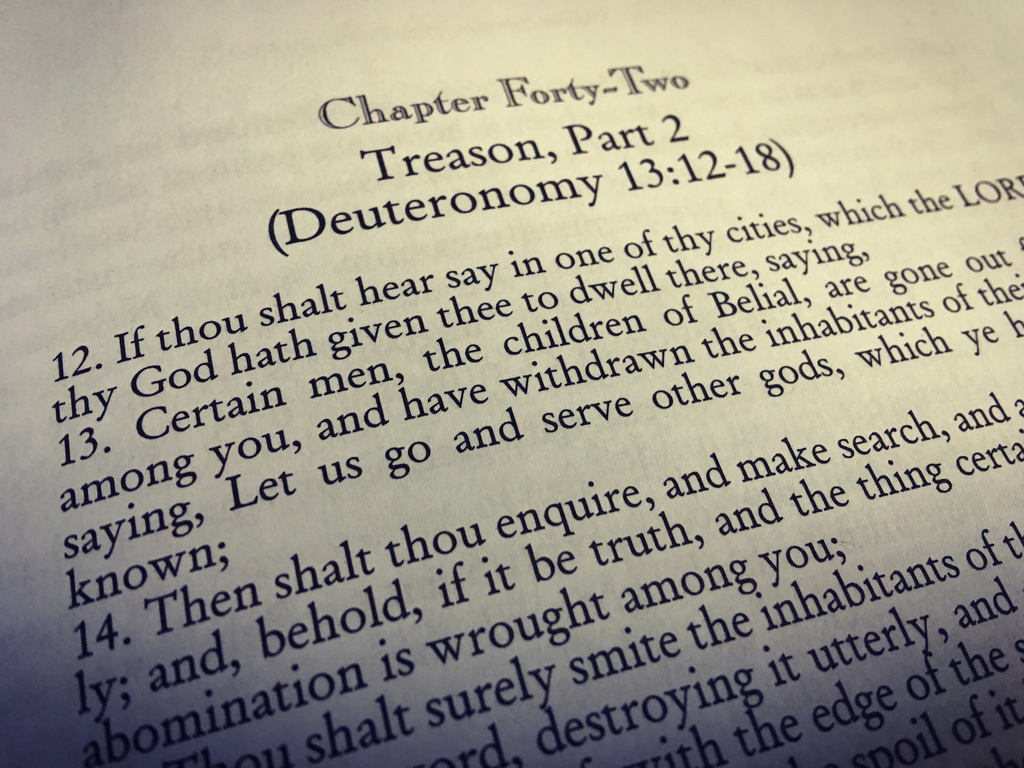
Treason, Part 2 (Deuteronomy 13:12-18)
There are many churchmen who wish that texts like this one would disappear. Like Matthew Arnold, they want a religion of sweetness and light, not a strong and militant faith.

- R. J. Rushdoony
(Shortened extract reprinted from Deuteronomy [Vallecito, CA: Ross House Books, 2008], pp. 207-210).
There are many churchmen who wish that texts like this one would disappear. Like Matthew Arnold, they want a religion of sweetness and light, not a strong and militant faith. This text is again about treason. It does not call for searching out persons whose faith may be false, but for dealing with aggressive treason by covenant members against the covenant and the God of the covenant.
It calls for action because of a serious problem. “Certain men” are describable as “the children [or, sons] of Belial.” The word Belial in Hebrew means wickedness. According to ancient Hebraic accounts, the sons of Belial had abandoned the faith and were uncontrollably lawless. Having denied the covenant God, they denied and violated the covenant law as a matter of principle. The word Belial occurs twenty-seven times in the Hebrew Bible. It is used to indicate radically lawless men, as in Judges 19:22-26, who demand homosexual rape and will take a woman and abuse her to the point of killing her. It is not a term used lightly. The sons of Belial are associated with hell. They are ready to be used against the godly, as in the insistence of the two men who gave perjured testimony against Naboth (1Kings 21:10-13). Proverbs 19:28 says, “An ungodly witness scorneth judgment,” and the word translated as “ungodly” is “Belial.” It is a Belial witness who mocks justice. In 2 Corinthians 6:15, Paul asks,
And what concord hath Christ with Belial? or what part hath he that believeth with an infidel?
In 2 Corinthians 6:14 Paul prefaces his comment on Belial with the statement, “what communion hath light with darkness?”
Certain things are very clear about the biblical use of the term “sons of Belial.” First, these sons of Belial are aggressively anti-God and anti-Christ. They are deliberately lawless because they hate God. One aspect of their lawlessness is their homosexuality. God’s order is despised in all its manifestations, so that, whether it be sodomy or perjury, they are ready for it.
Second, as already indicated, they manifest a militant hatred of God and His law, and of God’s people. They resent God’s law and justice, and His holiness in anyone. Their aggressive aim is to humiliate and to defile all that is good. The term “sons of Belial” implies an uncontrollable and aggressive lawlessness. If permitted, they will take over a city or a society to remake it in their own evil image.
This should tell us why any text concerning “sons of Belial” is important. We live in a world where the sons of Belial are in high places, where they riot in the streets, and where they often command the media.
Such a city is at war against the covenant and the nation. Its actions have been aggressive and vicious. It is a perversion of the text to see it as a warrant for a fanatical attack on innocent people: they are lawless in every sphere. This is the meaning of being “sons of Belial.” To be indifferent to this threat is to surrender the nation.
Lawlessness is to be met with God’s law. Has the city worked against the punishment of criminal activity? Has it favored the lawless and the guilty against the godly and the innocent? A city was then a center for trade and for law. The surrounding countryside depended on it in both spheres, i.e., as a trading center, and as the locale of the courts of law. The lawless desecration of trade and courts means that the innocent are punished. This cannot be tolerated.
We have a reference to this law in the case of Gibeah, in Judges 20, 21. Although the assault and its aftermath indicate that Israel’s premises were somewhat mixed, i.e., not based solely on loyalty to God’s law, it does provide us with an incident where this law is applied.
In the case of Gibeah, the outrage of the people was due to a murderous rape and the threat of sodomizing a Levite. According to Hosea 9:9 and 10:9, more was involved. Gibeah had apparently given itself over to idolatry and to lawlessness. Their hostility was directed against a Levite, a servant of God, and they demanded the right to sodomize and to kill him (Judg. 19:22; 20:5). We are again reminded that this law deals with aggressive lawlessness and a militant hostility to God. There seems to be an echo of this law also in Joshua 7:26, the execution of Achan.
Otto Scott has observed that decadence is the inability of a culture or people to defend themselves. This law requires such a defense, not as vigilante action, but as a premise of godly law.

- R. J. Rushdoony
Rev. R.J. Rushdoony (1916–2001), was a leading theologian, church/state expert, and author of numerous works on the application of Biblical law to society. He started the Chalcedon Foundation in 1965. His Institutes of Biblical Law (1973) began the contemporary theonomy movement which posits the validity of Biblical law as God’s standard of obedience for all. He therefore saw God’s law as the basis of the modern Christian response to the cultural decline, one he attributed to the church’s false view of God’s law being opposed to His grace. This broad Christian response he described as “Christian Reconstruction.” He is credited with igniting the modern Christian school and homeschooling movements in the mid to late 20th century. He also traveled extensively lecturing and serving as an expert witness in numerous court cases regarding religious liberty. Many ministry and educational efforts that continue today, took their philosophical and Biblical roots from his lectures and books.